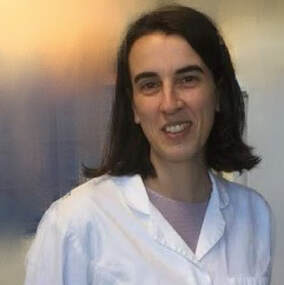
Joana Rodrigues
I began my studies at the University of Porto, Portugal, where I obtained a Bachelor’s degree in Biology and a Master’s degree in Marine Biology. After that, I moved to the University of Santiago de Compostela, Spain where I obtained my PhD in Endocrinology in 2019 in the laboratory of Professor Clara V. Alvarez.
During my PhD, I studied the PIAS2 protein. Depletion of PIAS2 by a specific siRNA, designed and made in the lab, induces cell death of human anaplastic/undifferentiated thyroid carcinomas (ATC), a rare cancer without therapy. We demonstrated specific activity of this molecule in primary ATC tumor cells in culture as well as in commercial cell lines. In contrast, it has no activity in normal thyroid follicular cells, nor those derived from benign proliferative disease or differentiated thyroid cancers. We also demonstrated that PIAS2 downregulation is a specific therapy for aneuploid cancers in vivo using a PDX model of ATC. We proposed that PIAS2 siRNAi is a possible therapy for ATC and a patent application was approved.
My current work as postdoctoral fellow in the laboratory of James DeCaprio focuses on the role of viruses in cancer. My main interest is understanding the mechanisms that cause cancer using novel model systems to develop therapies that could be translated to the clinic.
I began my studies at the University of Porto, Portugal, where I obtained a Bachelor’s degree in Biology and a Master’s degree in Marine Biology. After that, I moved to the University of Santiago de Compostela, Spain where I obtained my PhD in Endocrinology in 2019 in the laboratory of Professor Clara V. Alvarez.
During my PhD, I studied the PIAS2 protein. Depletion of PIAS2 by a specific siRNA, designed and made in the lab, induces cell death of human anaplastic/undifferentiated thyroid carcinomas (ATC), a rare cancer without therapy. We demonstrated specific activity of this molecule in primary ATC tumor cells in culture as well as in commercial cell lines. In contrast, it has no activity in normal thyroid follicular cells, nor those derived from benign proliferative disease or differentiated thyroid cancers. We also demonstrated that PIAS2 downregulation is a specific therapy for aneuploid cancers in vivo using a PDX model of ATC. We proposed that PIAS2 siRNAi is a possible therapy for ATC and a patent application was approved.
My current work as postdoctoral fellow in the laboratory of James DeCaprio focuses on the role of viruses in cancer. My main interest is understanding the mechanisms that cause cancer using novel model systems to develop therapies that could be translated to the clinic.
